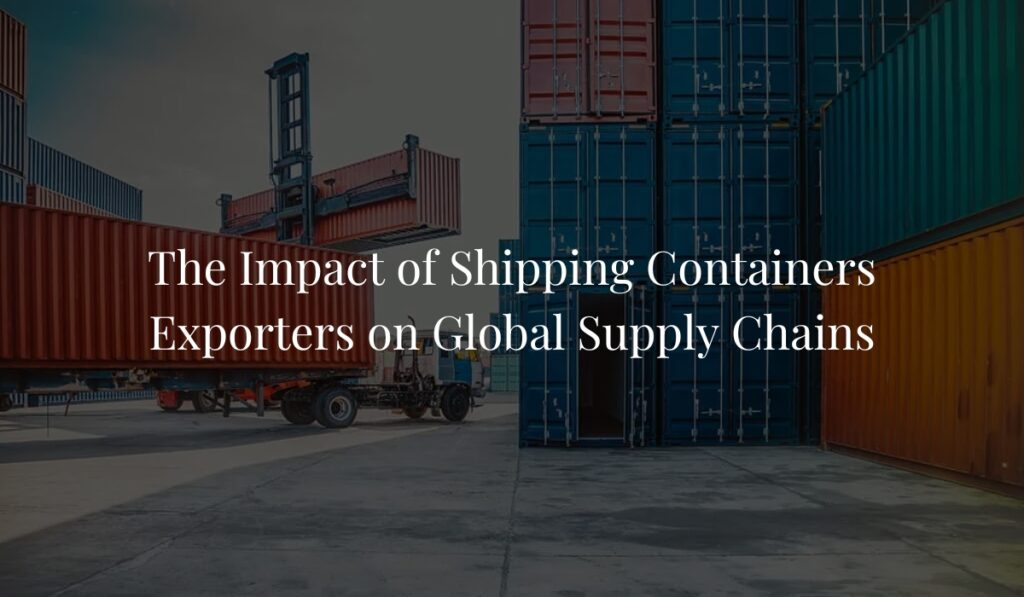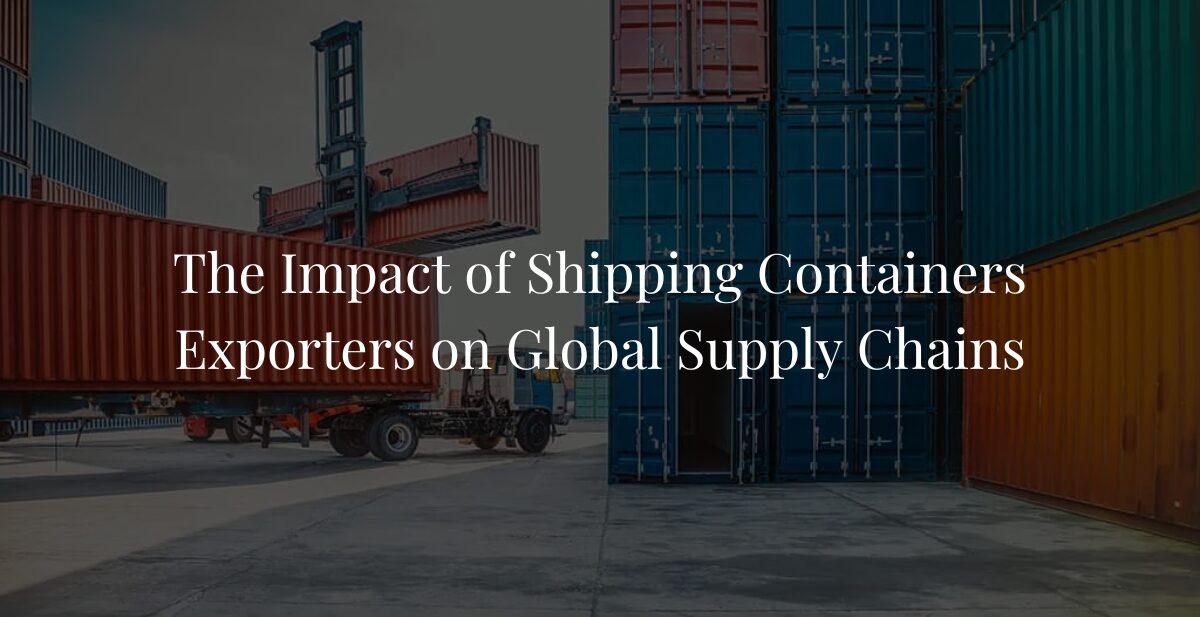- 15/10/2024
- by superadmin
- Shipping Container Manufacturer
The Impact of Shipping Containers Exporters on Global Supply Chains

The globalization of trade has fundamentally transformed the dynamics of supply chains, with shipping containers playing a pivotal role in this evolution. As the backbone of international commerce, shipping containers enable the efficient movement of goods across vast distances, facilitating trade between countries and continents. The emergence of specialized shipping container exporters has further revolutionized this landscape, providing essential infrastructure and services that optimize the flow of products in an increasingly interconnected world. This article delves into the significant impact of shipping container exporters on global supply chains, exploring how their innovations and operational efficiencies contribute to the overall effectiveness of logistics networks. By examining key trends, technological advancements, and the strategic importance of containerization, we aim to highlight the critical role these exporters play in enhancing supply chain resilience and responsiveness. Moreover, we will address the challenges faced by this sector, including environmental sustainability and evolving regulatory frameworks, which are essential for shaping the future of global trade. Ultimately, understanding the contribution of shipping container exporters is crucial for stakeholders seeking to navigate the complexities of modern supply chains and capitalize on emerging opportunities in a rapidly changing economic landscape.
1. Role of Shipping Containers in Logistics
Shipping containers are integral to modern logistics, providing a standardized and efficient means of transporting goods across various modes of transport, including sea, rail, and road. Their robust design allows for the safe storage and transit of a wide range of products, reducing the risk of damage and loss. Shipping containers exporters play a crucial role in this system, ensuring that these containers are readily available and meet international shipping standards. By facilitating the seamless movement of goods, they contribute significantly to the efficiency of supply chains and help businesses respond swiftly to market demands.
Storage Container Dealers also play an essential part in the logistics ecosystem by supplying containers for temporary storage solutions, onsite operations, or specific project needs. Their services support businesses in optimizing space and managing inventory more effectively. In a landscape where agility and responsiveness are paramount, platforms like dbshipping.in further enhance the logistics framework by providing critical information and services related to container availability, pricing, and shipping schedules. This interconnected web of services underscores the vital role that shipping containers play in fostering global trade and operational efficiency.
2. Cost Reduction Through Containerization
Utilizing containerization has proven to be a significant strategy for cost reduction in logistics and supply chain management. By standardizing cargo units, businesses can streamline their operations, reduce loading and unloading times, and minimize handling costs. This efficiency not only lowers transportation expenses but also optimizes storage utilization, allowing for more effective inventory management. Shipping containers exporters are pivotal in this process, as they ensure the availability of high-quality containers that facilitate the quick and safe transfer of goods.
Moreover, the adoption of containerization promotes economies of scale, enabling companies to consolidate shipments and reduce per-unit shipping costs. As businesses increasingly rely on shipping containers for both domestic and international transport, they benefit from enhanced flexibility and reduced risk of spoilage or damage to their products. The role of Storage Container Dealers further complements this system by providing tailored storage solutions that help businesses adapt to fluctuating storage needs without incurring additional overheads. By leveraging these advantages, companies can significantly enhance their competitive edge in a dynamic marketplace, as evidenced by platforms such as dbshipping.in, which connect exporters and dealers to streamline operations and reduce costs.
3. Environmental Benefits of Container Shipping
Container shipping offers significant environmental advantages by optimizing resource use and minimizing waste throughout the logistics chain. The standardization of containers allows for more efficient stacking and cargo configurations, leading to reduced fuel consumption per unit transported. This efficiency not only lowers greenhouse gas emissions compared to traditional shipping methods but also contributes to decreased congestion at ports and along transport routes, ultimately resulting in a smaller carbon footprint for the shipping industry.
Additionally, the durability and reusability of shipping containers support sustainable practices in transportation and storage. As shipping containers are built to withstand harsh conditions, they are repurposed in innovative ways, such as housing, offices, or retail spaces, which further extends their lifecycle and reduces the need for new materials. By partnering with reputable shipping containers exporters and utilizing sustainable storage solutions from Storage Container Dealers, businesses can enhance their commitment to environmental stewardship while maintaining efficient supply chain operations. For more information on environmentally responsible shipping practices, resources are available at dbshipping.in.
4. Challenges Faced by Exporters Today
Navigating the complexities of international trade, exporters today encounter a myriad of challenges that can hinder their operational efficiency and profitability. Fluctuating tariffs and trade policies create an unpredictable environment, compelling businesses to adapt quickly to changes that can affect their pricing structures and market access. Additionally, logistics disruptions, often exacerbated by global events or pandemics, complicate the timely delivery of goods. Exporters must also grapple with the rising costs of shipping containers and transportation, which can eat into margins and impact overall competitiveness in the marketplace.
Moreover, compliance with an increasingly intricate web of regulations and standards across various countries adds another layer of difficulty for exporters. This can include customs requirements, documentation, and quality control measures that must be met to ensure products reach their intended markets without delays. Partnering with reliable storage container dealers and leveraging platforms like dbshipping.in can provide essential resources and expertise to help exporters navigate these challenges, facilitating smoother operations and fostering resilience in a volatile global landscape.
5. Future Trends in Container Shipping
As the global trade landscape continues to evolve, innovative technologies and sustainable practices are expected to reshape container shipping significantly. The adoption of automation and artificial intelligence is likely to enhance operational efficiency, allowing shipping containers exporters to optimize their supply chain processes. Smart containers equipped with IoT sensors can provide real-time data on cargo conditions and location, enabling better inventory management and reducing the risk of losses. Moreover, the shift towards greener shipping solutions will drive companies to explore alternative fuels and energy-efficient vessels, aligning with global efforts to reduce carbon emissions.
Additionally, the rise of digital platforms and blockchain technology is anticipated to streamline logistics and enhance transparency throughout the supply chain. Storage container dealers are also expected to play a crucial role in this transition by offering flexible and innovative storage solutions that adapt to fluctuating demand patterns. With companies like dbshipping.in leading the charge in digital transformation, the container shipping sector is poised for a future characterized by increased collaboration, reduced costs, and a more resilient global supply chain network.
In conclusion, the role of shipping container exporters in global supply chains cannot be overstated. As the backbone of international trade, these exporters facilitate the efficient movement of goods across vast distances, significantly reducing transit times and costs. Their ability to adapt to changing market demands and embrace technological advancements—such as automation and digital tracking—ensures that supply chains remain resilient and responsive in an increasingly complex global landscape. Moreover, as businesses continue to navigate challenges such as geopolitical tensions and environmental concerns, the contributions of shipping container exporters will be vital in fostering sustainable practices and enhancing supply chain transparency. Ultimately, their influence extends beyond mere logistics; they are essential players in shaping the future of global commerce.











